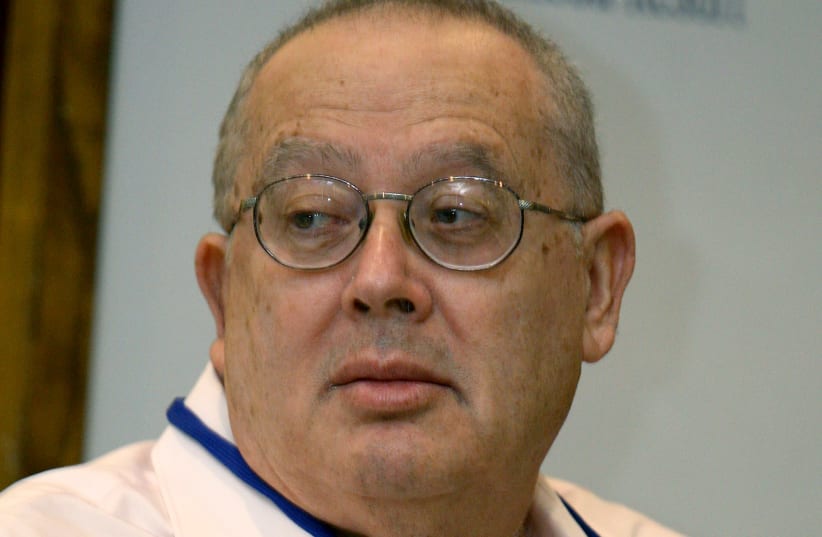His ancestry was not just in Poland, but also in Belarus and Ukraine.
His parents stayed in Poland for six months, then moved to Germany.
Following the creation of the State of Israel, his parents had two options – to join family in the US or to come to the fledgling Jewish state. They chose the latter.
Their first year in Israel was no picnic. They lived in a transit camp near Netanya. It was a far cry from an immigrant absorption center.
A year later, his parents, in a pioneering spirit, joined the first residents of a new Haifa neighborhood called Kiryat Yam. Mekel’s father who had been a teacher in Europe became a policeman in Israel.
The family moved yet again – this time to Kiryat Haim where Mekel’s mother gave birth to two more boys.
Mekel moved south when doing his compulsory military service, where he was assigned to Army Radio, which would play a stellar role in his future life.
Journalism was his natural forte. He began contributing to children’s magazines when he was eight years old, so he wasn’t exactly entering a new world.
Even prior to joining Army Radio, he enrolled at the Hebrew University, because he had completed high school at an earlier age than usual.
While in Jerusalem he responded to an advertisement that was offering a training course for broadcasters.
Later, while at Army Radio, he persuaded his superiors to allow him to work as a military and diplomatic correspondent in Jerusalem. In a very short space of time, he was also reporting on the government and the Knesset.
Like his parents, he and his wife Ruth, also married at a very young age. He was 22, and she was approximately the same age.
He quickly made a name for himself as a broadcast journalist and interviewed all the big names in politics.
In November, 1970, at age 24, he joined the staff of Israel Radio, while simultaneously continuing his PhD studies at the HebrewUniversity.
Then in 1976, he was offered the opportunity to be a Jewish Agency emissary in Cincinnati, Ohio.
While in Ohio, he continued to broadcast for Israel Radio, and was an adjunct professor at the University of Cincinnati where he taught a course about modern Israel.
At the conclusion of his three- year stint as an emissary, the family returned to Israel, and Mekel was back in the studios of Israel Radio.
In the interim, something had gone sour, and he was no longer excited about reporting. He decided that he wanted to be an academic and won a scholarship to Columbia University in New York, where he hoped to get his PhD and later teach communications and sociology at the Hebrew University.
While at Columbia, he also worked as a journalist reporting on the Israeli Mission to the United Nations. Apparently, he made an impression on Israel’s then permanent representative Yehuda Blum, because before he could complete his studies at Columbia, Mekel was offered a job at Israel’s Foreign Ministry. This occurred during Yitzhak Shamir’s time as foreign minister. Mekel was assigned to be Shamir’s adviser. A year later, when Shamir became prime minister, he took Mekel with him to the Prime Minister’s Office.
It was one of the most exciting periods of Mekel’s career, because he was privy to many state secrets and he also accompanied Shamir on his trips abroad.
Unlike Ben-Gurion, Shamir was not averse to speaking Yiddish, which was Mekel’s mother tongue, and the language in which he continued to converse with his parents. He and Shamir often spoke to each other in Yiddish.
As much as he loved working in the Prime Minister’s Office, he was also tempted by other considerations and when in 1989, Shamir offered him the chance to be the director-general of the now defunct Israel broadcasting Authority, the top job in the organization, which he had initially joined as a young radio broadcaster, he jumped at the opportunity. He was then 43-years old, and stayed at the helm till he was 47, after which he returned to the Foreign Ministry and was posted in Atlanta, Georgia, where he served as consul general.
During that period, he regularly took American dignitaries on trips to Israel where he acted as their personal guide, even though there was a professional guide accompanying them.
During the First Intifada, he was besieged by both American and foreign journalists stationed in America, but was always prepared to answer their questions.
Mekel was always good at thinking on his feet, and even when he no longer reported for Israel Radio, if some major news event broke out wherever Mekel was stationed, he got a call, and reported without putting pen to paper or finger to keyboard.
In 2003, he was asked to be deputy to Israel’s permanent representative at the UN, a position he may have acquired because he spoke some Arabic, Russian and Polish – which were all useful languages. At that time, he worked closely with Dan Gillerman.
He was subsequently appointed consul general in New York. On his return to Israel, he was appointed the Foreign Ministry’s deputy director-general for cultural and scientific affairs
After that, he served as Israel’s ambassador to Greece, and following his retirement from the foreign service, he went back to academia, working as a senior research associate at the Begin-Sadat Center for Strategic Studies at Bar-Ilan University.
He is survived by his wife Ruth, his daughter Mayaan, his sons Tal and Nitzan and five grandchildren.
